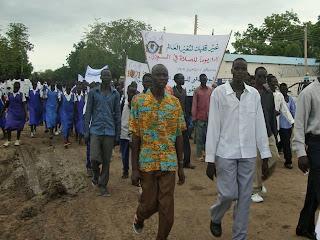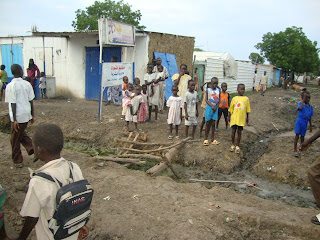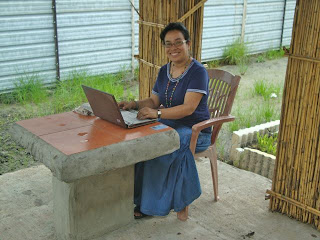It is six days now since we have had town power. The referendum may be two months away but already there are shortages beginning to occur in Malakal. No service station is selling diesel. So we can only run our generator for short periods. As I type, I am sitting in my room with a candle flickering in the background. Just a little light but it makes all the difference. The candle gives light but it also warms the darkness – not literally but metaphorically. Candle light is cosy light; candle light brings comfort; a candle flame is a powerful symbol of hope and a future.
What was it George Bernard Shaw stated so graphically?
"I want to be thoroughly used up when I die, for the harder I work the more I live. I rejoice in life for its sake. Life is no brief candle to me. It is a sort of splendid torch which I've got hold of for the moment and I want to make it burn as brightly as possible before handing it on to the next generation."
Yes life is a splendid torch, an opportunity to burn brightly, to make a contribution, to make a difference – for the better. Life does not last forever. Like the burning candle we are consumed. We are all consumed in death. The real issue is what do we do when we are alive? What will we pass on to the next generation?
Elsewhere the irascible Shaw wrote:
“Life is a flame that is always burning itself out, but it catches fire again every time a child is born.”
Shaw is also the poet, the conveyor of vivid, verbal imagery. ‘A child is born’. Jesus is born in Bethlehem and God is among his people. There are many children in Sudan. They are the future of this country. The people of Southern Sudan may be poor economically but they are rich in family life and optimistic for their future. They see light after the darkness of war. Many express an overt faith in Jesus who said ‘I am the way the truth and the light’. (John 14:6)
Jesus is the light that encourages them in their joyful celebrations of mass. God is revealed in their faith, gratitude and good will to those of us who have come to live with them. Here it is normally good to be seen as part of the Church – untainted and respected - because the Church stood with the people during all the war years. But a couple of days ago as I was getting into our vehicle after shopping at the market, a small, untidy-looking Sudanese woman, who was carrying a child on her hip, picked up a stone and flung it into the windscreen. Fortunately it did no damage. Very unusual. Did she resent what I have and she does not? What was the darkness in her life that led to this action? I have no idea but it reminded me that how I feel may not be how I am perceived. What is the light I give out?
Robert Louis Stevenson (1850 to 1894) told a story from his childhood when he gazed from his window on a dark night as a man came down the street lighting the gas lamps. Robert called out to his mother:
‘I see something wonderful. There’s a man coming down the street poking holes in the dark’.
Sometimes it is beyond us to take away the dark. There is so much still to be achieved in Southern Sudan but we can punch a few holes in the dark. It is always ‘better to light a candle than to curse the darkness’ as the proverb states. In anyone's life, there can be dark times when burdens, disappointments or depression seem overwhelming. One small light, a candle of hope, is all that is needed to ensure the darkness does not become overwhelming.
– Br Bill

Pointed

Naomi and Sara

Juba Children

Father Alberto, Construction Supervisor

Brothers from Australia

Sister Betty & student teachers


















































.jpg)